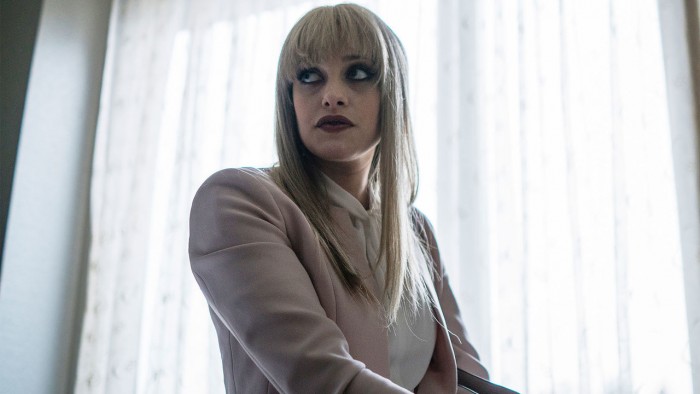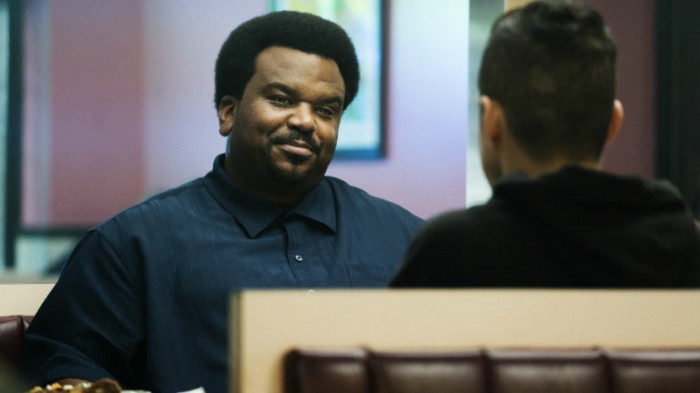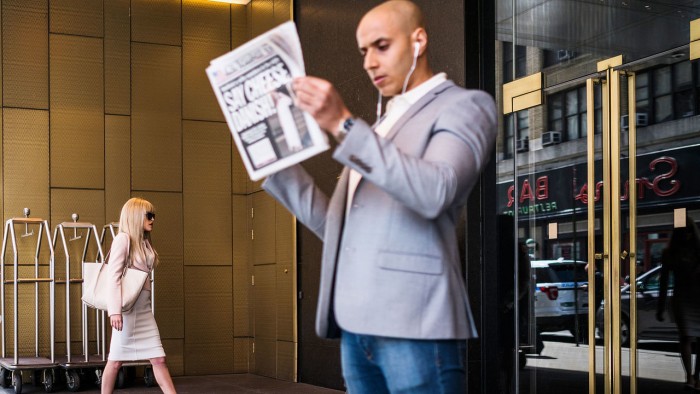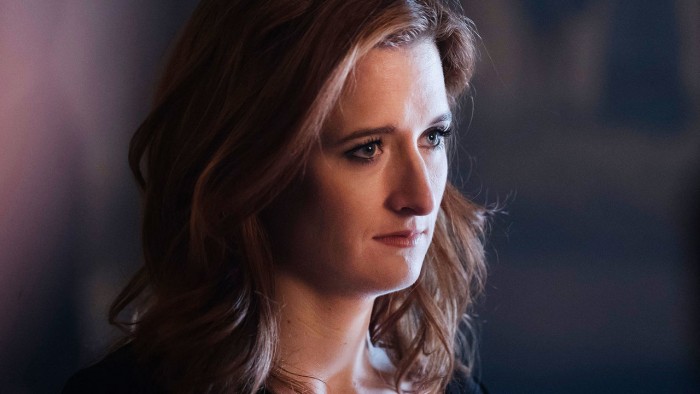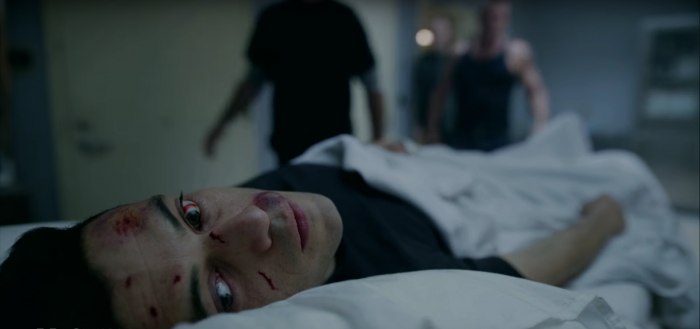Mr. Robot - The 3 Things We Expect After "Master/Slave"
Let's talk for a moment about expectation. In other eras, television was all about expectation — that is, the expectation that each week, without fail, we'd get a familiar set of characters performing a familiar set of tasks in a familiar way with familiar tone and even familiar dialogue. Expectation; delivery. TV still serves that function. Even highly serialized shows will often stick to a kind of format. We know what we're going to get, and we're happy to get it.
There's another kind of expectation: expecting the unexpected. We expect that a show will shock us. At least once per season a favorite character will die, or a major revelation will occur, or a sudden event will reshape the format of the show going forward. Preferably this will happen several times per season, or, if you're Scandal, it'll happen several times per episode. As audiences, we become numb to it.
During the first season of Mr. Robot, obvious cinematic references, and a constantly shifting understanding of the show's end goal kept us on our toes. Twists came, but we expected twists to come. "You knew, didn't you?" Elliot asks when he learns the true identity of Mr. Robot. We've become so savvy as viewers that even show needs to recognize we're ahead of the game, if only to assure us it's in good hands.
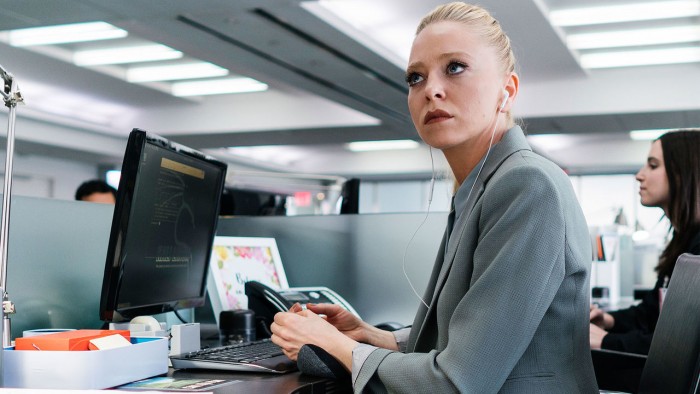
For a whole season, Mr. Robot expected us to expect the unexpected, and it delivered, but at some point that would get old. Sam Esmail clearly understood that, and in the show's second season he's attempted the difficult task of shifting the show into a grander space, and one which allows for a different kind of expectation. Fitting in with his auteurist mindset — and yes, I'm aware of the issues surrounding that label — Esmail has brought the series into stylistic focus. Like The Knick, and The Girlfriend Experience, and even older shows like Twin Peaks, Miami Vice, and The Prisoner, Mr. Robot is asking us to expect style. When we talk about the show years from now, it's not the plot — the twists — that we'll discuss, but the style of it all. The daring jolts in form. The expectation that at any moment the camera might surprise us — or the music, or the editing — if not necessarily the script.
The first season might have already given us a taste of this approach, but now the show hopes we'll expect it above anything else. The magic of it is that style is as good as tool as any for delivering an emotional gut punch. It's the synthesis of form with subject that makes us care, and in the latest episode, "Master/Slave," Esmail takes us on a whirlwind trip, stylistically entrancing and surprising us until we come around to a new understanding of who our protagonists are, and what drives them.
But enough preamble, it's time to address the episode at hand. And because Esmail dared to break with form, I'll do the same. No "questions" this week. Instead, let's journey through the expectation game... As usual, BEWARE SPOILERS!
Familiarity
I know. You want to talk about the incredible first act of this week's episode. Well. Too bad. I'll be getting to that later. First, let's talk about the ways in which this felt like a familiar episode of Mr. Robot. Familiar, though with a little bit of a twist.
Technically, this was the sixth episode of the second season, but it's actually the fifth week. If we look back to the fifth week of the first season, we find some curious repetition going on. That was the episode of the Steel Mountain hack. This week? Angela ventures onto the FBI investigation floor at E Corp, earpiece in her head, being fed information about her surroundings, her mission, and even the people standing in her way. Familiar? Completely.
There's no way it's a coincidence either. We're at the same point in the season, once again going on a hacking mission into "enemy" territory. This is the Mr. Robot we thought we knew; that we thought we might've lost in a possible sophomore slump. Here we had Angela, much like Elliot did the season before, figuring out a way to dress down a person in an instant, to tear down and flatter their ego all at once for personal ends. We also got to see the way in which a hack often needs direct physical contact, in contrast with the entirely virtual approach we're often presented with in media. Mr. Robot bridges the gap, showing us what hacking looks like in the real world. What it takes. And more importantly, the very direct risks along the way.
But the hack wasn't the only familiar element. Let's not forget Elliot's association with criminal kingpin Ray. An odd plot, and not exactly related to the main arc of the series, which is highly reminiscent of the Vera arc in the first season. Once we've found Elliot mess with criminals for his own purposes, only for it to come right around. But where last season is was Shayla who was the victim of his dalliance with the underworld, here he is the one taking the beating. He cannot get away clean, and his belief that "saving the world" will carry him through hasn't exactly worked out for him, or the people he cares about.
With both of these storylines, "Master/Slave" has given us that taste of Season 1 we so craved. For a few episodes now we had felt unmoored, maybe unsure whether to trust in the path the show's creator was leading us down. Though the show hasn't explicitly stated its direction for the season, this episode reminds us the show still knows what it is, and what it can do well when it's really cooking. It's comforting. Easing us with familiarity; assuring us that the show we fell for is still there, under the surface, but pushing toward something new.
The Unexpected
Alf! Remember Alf? Well he's back! In Mr. Robot form.
I'll bet you never expected to see Alf on Mr. Robot. If you had listed a thousand things that might conceivably happen this season on Mr. Robot, you would never in your wildest dreams have written down, "Alf appears in wild hallucinatory parody of early-'90s sitcoms." Never. That's the power of the unexpected. You'd never think the show would do something like that, but of course it did. It's Mr. Robot. It does wild and unexpected things.
And those unexpected things aren't limited to weird, extended sitcom parodies. For one thing, look at Ray. When Craig Robinson was announced as a cast member for this season, I was confused, but also sure he would play some kind of comedic character. Boy, was I wrong. Ray is scary as hell, and Robinson plays it perfectly. It's the approachability that makes him frightening. He seems like the kind of guy you could be friends with, and then he starts talking about his dying dog in the most sinister way and you realize you've been had.
Or how about whatever the hell is going on with Angela? We always knew she was highly competent, but this season we are peeling back layer after layer. It's still nowhere near clear what she's playing at, or whose side she's really on, but when she's left to her own devices to throw off the scent of that douchebag FBI agent on the 23rd floor, she reveals a part of herself I never imagined was there. Those confidence building audiobooks have really paid off, which is to say they've unlocked an element of her character that is at once stronger and meaner than we ever had reason to believe about her before. Again, completely unexpected, shocking, and exhilarating.
Now, it may have been expected that Dom, the oddball FBI agent, would cross paths with Angela, but the moment it arrived was shocking in itself, and more shocking still because the episode cuts away, leaving us to wonder at the result. If you'll recall, the same thing happened last week with that even more shocking attack in Beijing. We never got to see the resolution of that sequence, but this week we learn, perhaps surprisingly, that the second gunman also turned his gun on himself. A peculiar twist that hints at the larger role the Dark Army has to play in the overall course of the series. And speaking of the Dark Army, I definitely never expected to find out what it looks like when somebody shoves a syringe needle through the top of some else's finger and then breaks it so it stays in there. I'll be fine with never having to see that again, now that I think about it.
Mr. Robot is a show filled with unexpected turns, unexpected moments, unexpected images. It's much like the rest of the high-octane serialized television landscape in that way. It happily claims a spot alongside Lost and Breaking Bad in that regard. It also follows through. A twist or unexpected moment, it's not just for the shock. Mr. Robot uses its twists to change our understanding of characters, and to upend our perception of where the show might be taking us. In that sense, "Master/Slave" was another crackerjack episode. Thrilling on a plot level alone. But of course, that's not all the show is interested in.
Style
Style. So nebulous a concept. What does it really mean? And to what do we attribute it? All tough, philosophical questions folks in universities have been arguing for millennia. We're not going to suss it out here, so let's get a little more specific. Much has been written about Mr. Robot's style. It's unique visual style—not just dark, but oddly framed, with characters often occupying only a corner of a frame, with dead space all around them. It's in the editing, which from scene to scene can be quite typical, but within a scene can be very unusual, favoring the isolation of the characters from one another to match the framing. It's in the music, which ventures from electronic to classical, incorporating a broad, often funny mix of soundtrack choices, winking nods to other films, and in some cases—as with the Parallax View score from a couple episodes ago—straight lifting from other films. And that brings us to the stylistic references. There's a lot of Fincher, of course, but then there's Kubrick, and Coppola, and DePalma, and just about every other canon director you'll find on the IMDb Top 250. The show can occasionally feel like a lot of other ideas from other sources stitched together into something barely new, but Esmail has practically incorporated that knowingness into the text.
Style isn't just superficial aesthetic choices, though. There's also the matter of tone, and even the pace and structure of storytelling. In that respect, Mr. Robot is both very much like a lot of TV that has come before, and unlike anything else at the same time.It's a dark and gritty show about an anti-hero, with gloomy colors and a twist, violent undercurrent to match. Blah blah. If it were just that, it'd be boring. A second-rate Dexter, as the pilot originally hinted at. Mr. Robot bristles at that kind of hemmed-in style. It is not just one thing. Stylistically, the show pushes itself out of the normal bounds takings its cues from Elliot's state of mind to be heightened, sometimes to the point of self-parody, and in same cases heightened into full-on parody, as with this week's opening.
And still Mr. Robot pushes. Not content to simply parody old sitcoms, the show extends the riff until its breaking point. We begin to wonder whether the whole episode will be a '90s sitcom, and we sit there wondering whether we can even stomach the idea. And just as the gambit begins turning truly sour, genuinely uncomfortable, we're pulled out of it. What we come to realize is the parody was a bit of stylistic fun, but also much more. It was an attempt to give us an old idea of comfort, of familiarity in TV tropes, and force us into looking at that comfort fondly while understanding that it can never actually work within the world Mr. Robot has given us. There's just too much damage. The "real" world bleeds through. The pain.
So, when Elliot gets hauled out of the hospital by Ray's goons and thrown into a dank basement, we remember the value of that comfort—even the simple attempt at providing some solace, some buffer against the cruelty of Elliot's predicament and the world he inhabits. Mr. Robot appears, and for the first time, his appearance doesn't feel like a threat. Elliot gets up and hugs him. Falls into his arms. Leans on him. This was why Elliot created Mr. Robot in his mind in the first place. The comfort of his father, always there for him.
It's then that we finally get to see what normalcy looks like. A flashback to the car ride where Elliot's dad told him he was sick. Also the day he showed him the new store and asked Elliot to name it. The story begins with Elliot's wild, sinister sitcom dream, and then mostly leaves him, letting the story touch on its other characters, only to wrap back around and give meaning to what may have at first seemed like a gimmick. What we find is a troubled young man, feeling alone in the world, and the only thing propping him up — though not always in the most constructive ways, admittedly — is the memory of his father, who cared deeply for him, and who promised him he'd always be there for him, no matter what. That's all Elliot has, and it's what will keep him alive in the face of Ray, and E Corp, and the FBI, and the Dark Army, and even his own mental illness and crippling loneliness. That's good storytelling with style.
Stray Thoughts

